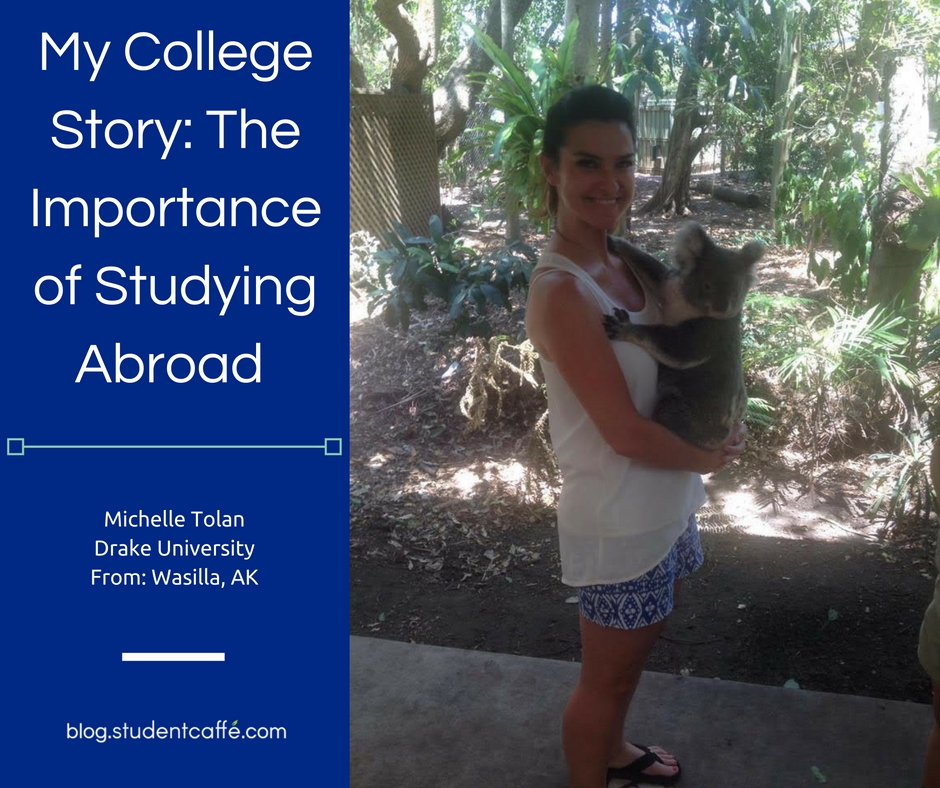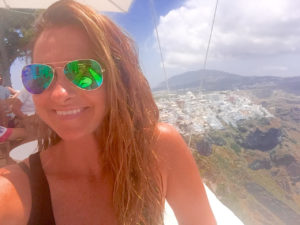
Michelle holds a koala in Australia. (Michelle Tolan)
Michelle Tolan was born in Wasilla, Alaska. In her words: “Yes, that one, and no, I couldn’t see Russia from my house.” As a first-generation college student, she attended Drake University in Iowa, where she majored in broadcast journalism, minored in political science, and concentrated in Spanish. During undergrad, she spent time abroad in both Germany and Costa Rica and loved it so much that she returned to graduate school with the intention of working in the field of study abroad. She now works for the Institute for Study Abroad.
Q. You attended college in Iowa but were raised on the West Coast. What was your adjustment period like?
I tell everyone my first study abroad experience was in Iowa. Although I had traveled quite a bit outside Alaska, I'd never lived anywhere else before and AK has such a unique culture. More than anything, my adjustment was in understanding how Midwesterners communicate (very, very subtly), which was very different from the more rugged place I was born and raised. But I couldn't have picked a better place to move away for college. Every holiday break and long weekend, all my Midwestern friends' families would invite me into their homes, and I really formed the closest relationships of my life, which continue today.
Q. What were your future aspirations during college? Did those change as time passed?
I chose Drake because of its strong journalism program, and I really was able to do so much there in that field. I interned with a local NBC affiliate, produced television stories for the Des Moines Public Schools, and worked for CNN during the renowned Iowa caucuses (and got PAID, which was a big deal for a journalism internship). My sophomore year, I was selected to participate in a journalism fellowship, which traveled to Germany to do a series of informational interviews and reports for a national newspaper, The Frankfurter Allgemeine. It was a program financed by the German bureau of cultural affairs, so, funny fact: the German government bought my very first international plane ticket. The rest is pretty much history.
Q. Did you study abroad during college?

Michelle Tolan
I did. About a year after my fellowship in Germany, I spent a semester in Costa Rica attending the Universidad Nacional through the Institute for Study Abroad, Butler University (IFSA-Butler). To say it was formative would be a gross underrepresentation of the experience, but let's just say it helped clarify what I was meant to do. I had been so lucky, in the end, for choosing Drake because it had a strong education abroad culture on campus, so I really did it because I didn't know any better (and my friends were all doing it!). I was a first-generation college student and had so many moments abroad of “I can't believe I'm here; I can't believe I get to do this” that I knew I had to make the experience accessible to more students. So, I went to grad school and tried to get into the field of international education.
Q. You currently work for the Institute for Study Abroad. What is your position there?
My title is Field Director for Inclusive Excellence and Research, and my primary role is in serving as chief diversity officer for the institution. I do scholarship development, staff training and discussion leadership, and advocacy in the professional field of study abroad. My research area is mostly in how first-generation college students engage (or do not) in international education, their unique skills and assets to study abroad, and the barriers they might encounter in the process.
I also do quite a bit of institutional relationship management and support our partnerships with the U.S. universities that send students on our programs around the world.
Q. Why do you think it is important that all students, regardless of their financial background, have the ability to study abroad if they should choose to do so?
There is emergent research [by George Kuh] that study abroad is a High Impact Educational Practice and can have great impact on students' academic success both while abroad and when they return to campus. There is a particular imperative for students underrepresented on college campuses (first gen, students of color, students of low-to-middle income), because HIPs can have compensatory effects for them, essentially leveling the academic playing field in graduation rates and GPA. It's all really cool stuff, but one of the biggest problems for us in international education is debunking the perception that study abroad is fun, a vacation from academics. In that respect, we are a victim of our own popularity and visibility.
At most universities, if you can afford to attend the university, you can afford to study abroad. Study abroad comes in all shapes and sizes, from one-week short-course programs to fully integrated academic years abroad. Ironically, for students on high financial aid, a semester abroad might be even more affordable than a short-term study abroad program because federal financial aid can be applied. Short-term programs tend to be more out-of-pocket for those on federal aid.
And the other obvious answer is that the world has a global economy. So, even if a student is an engineer and wants to work for a corporation like John Deere, there is a very good chance they will, one day, be up for a job at a plant overseas. The skill sets and international navigability that study abroad can facilitate for students is no longer a bonus; it is an essential academic endeavor for future global professionals.
Q. How would you recommend that students choose their study abroad destinations?
I would say, first, to focus on where you can take courses that will come back for your degree. Some students have very lock-step curricula and have to take courses in their major abroad, which can be challenging to find a course match but very common. It's not as difficult as it seems.
Once you've decided on your academic priorities, I recommend thinking about where you want to BE for a semester. Not where you want to travel, but where you want to BE. You will be a local; you will have your favorite place to study; you will wake up with the same view every morning. Of course, you will travel, but the things you will miss the most won't be the three-day trip to Iguazu Falls, it will be the people and the food and the place. So, decide based on that [and] you won't pick the wrong place, no matter what. Every study location will have its pluses and minuses; our job is to learn them.
Q. You travel a lot for work, both within and outside of the United States. Where is the most interesting place you've visited?

Michelle Tolan
Well, first I'd have to say that traveling actually made me more profoundly appreciate how stunning and interesting Alaska is. It's now, truly, one of my favorite places to travel because I have been a lot of places, and hardly any compare to the raw and real beauty of Alaska and Alaskans.
When I think about the places I find most interesting, there is no one answer because each has its striking attribute. The haunting fog at dawn over Machu Picchu; the confounding and musical Welsh accent; the tender political wounds of former Yugoslavia; sunsets in Santorini; smiling and generous people of Costa Rica; the tango which tells a story of Buenos Aires—they all left indelible prints as the most interesting for me.
-
My College Story: Working Full-Time and Attending Graduate School
-
My College Story: Graduating After Years of Study, Transfers, and Time Off
-
My College Story: Expanding a Study Abroad Experience
-
My College Story: Handling a Tragedy during the Semester
-
My College Story: The Power of Motivational Majors and Self-Education
-
The Story of Student Caffé: The Source for Information on Higher Education
-
My College Story: Taking Chances and Trusting Your Path to Education
-
My College Story: Thriving through On-Campus Work Opportunities
-
My College Story: Confronting the “Home Ec” Stigma
-
My College Story: The True Value of Education
-
My College Story: Becoming a Police Officer
-
My College Story: Starting a Design Business as a Young African American

